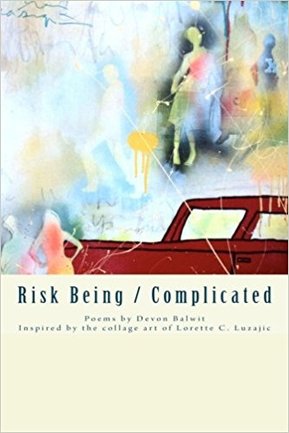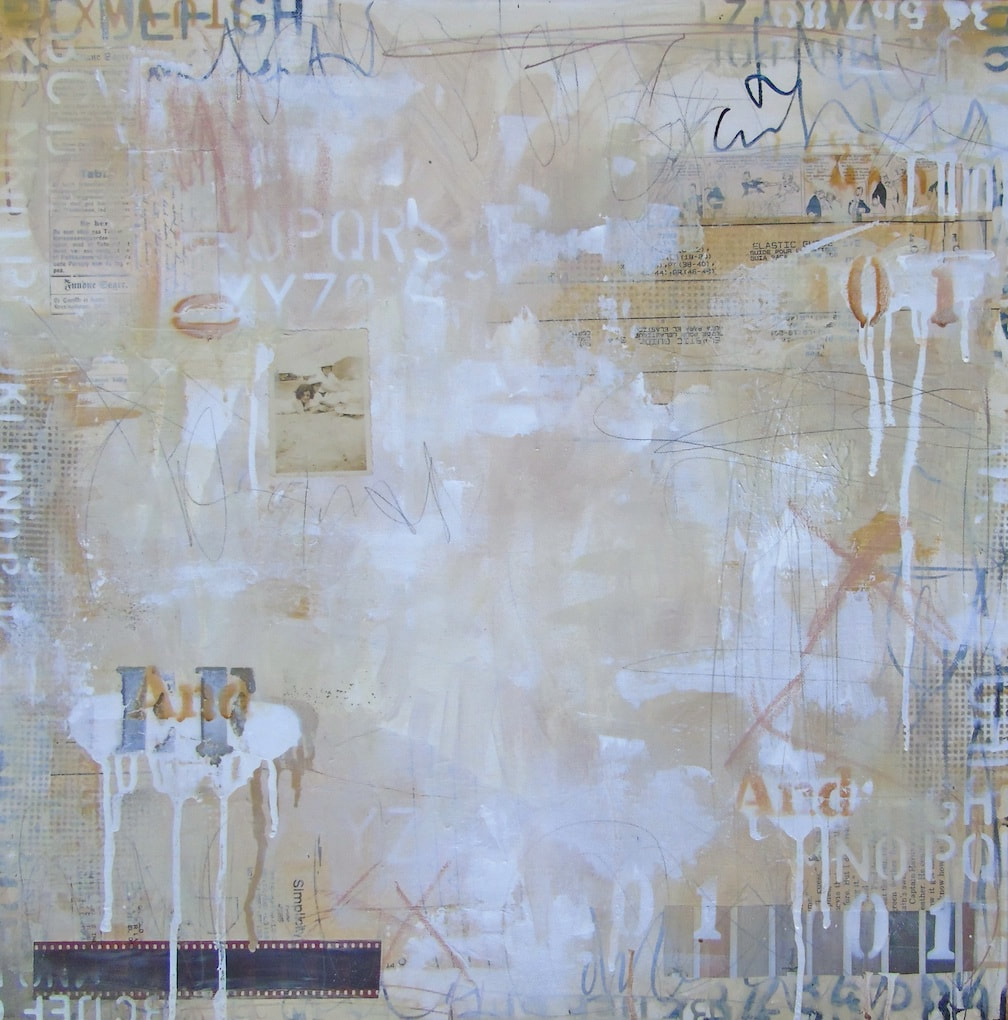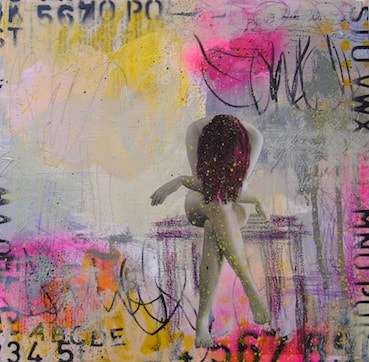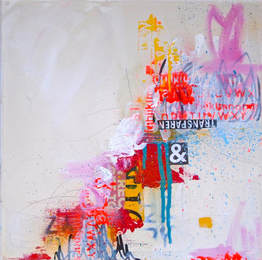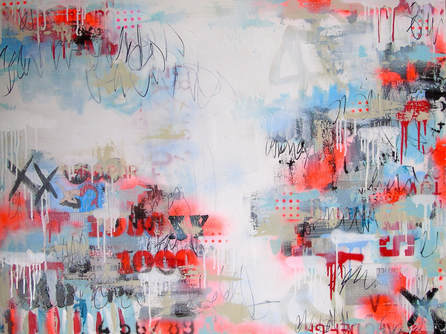|
Collaboration Interview: Devon Balwit and Lorette C. Luzajic Devon Balwit, a longtime contributor to The Ekphrastic Review, and the Review's editor, artist Lorette C. Luzajic, collaborated on a book called Risk Being / Complicated. Balwit was inspired to write dozens of ekphrastic poems inspired by Luzajic's mixed media collage paintings. They are presented side by side in this full-colour poetry collection released this year. To explore the process of writing, painting, and collaborating, and share it with you, Lorette and Devon interviewed each other. Lorette Interviews Devon Lorette: How do you approach looking at an artwork when you write ekphrastic poetry? Devon: I look at a piece and ask myself, "Where can I enter this work?" "What is the gateway?" "What is its salient feature?" "What is its mood?" "What entity does it evoke?" Colour, form, content, and even the title of the piece all play a role. I usually move on to a different piece after the initial one as I have the sense that once I have addressed a poem to it, its story has been "told." I have yet to explore whether the same work could inspire a multitude of poems. The same artist certainly can, but I haven't tried writing a sequence of poems about a single canvas. Lorette: What moves you in art? What catches your attention, and what turns you off? Devon: I'm turned off by manga. There's something about the predictability, sameness, and rigidity of the forms that is nightmarish. Also, I'm put off by work that doesn't have enough soul, enough intentionality. This might be hard to explain, but some work feels made to fill a space--like pure interior decoration. It's simplistic. It's not work I'd choose to engage with because it doesn't take me anyplace surprising. It doesn't ask enough of my brain. When I was a child, I didn't "get" non-representational modern art, but now it's my favourite genre as it evokes so many questions. Lorette: In what ways does creative collaboration contrast for you as a writer with working solo? Devon: I enjoy word & hand exchanges--crossing boundaries between genres and working with visual artists in different media--painting, collage, sculpture, and drawing. I also like to use instrumental music--jazz or classical--as a jumping off point. The non-verbal nature of these other media push the boundaries of my subject matter. There's a rich potentiality in the non-verbal forms that attracts me. I prefer it to collaborating with other poets, which I find challenging. I'm not even comfortable sitting in a cafe writing alongside people I know. I get too distracted by the other writer--How fast are they writing? Have they already finished? Are they impatient? It brings in a social dimension which hinders my concentration. When I'm not at ease, I can't get to the deep place from which my work springs. I think I'd be fine having a poet mail me their work and then responding to it from my own space and in my own time. It's not the exchange that bothers me, but the sharing of space while I work. I need "A Room of My Own" to create. I've never tried to write in an artist's studio. I'd be curious to see if the "interference" was less as the nature of the work differs. Lorette: How has your poetry changed with age and experience? Devon: My poetry has changed quite a bit over the past decades. When I was in my twenties, I was under the impression that narrator of a poem was coequal with the poet. Poetry, therefore, meant "confessional" and "true" in a limited sense of being "about" me. Given that my life in my twenties consisted of exploring relationships, my work had a much narrower focus. Writing poetry in my 50s, I'm much less interested in "me." This isn't to say I don't sometimes write poems that touch upon various aspects of my "real" life as a partner, teacher, parent, mature woman, but now I'm more interested in writing persona poems and poems rooted in other people, places, and times. I take on historical and scientific subjects. I'm enchanted by ekphrastic poetry. I've broadened my scope. Similarly, I used to write predominately free verse. If I wrote any formal verse at all, it was only Shakespearean sonnets. Now I explore a variety of forms: sestinas, villanelles, ghazals, abecedarians, specular poems, golden shovels, and more. The "constraints" of the forms keep the writing process fresh. Also, now I'll accept almost any prompt whereas in the past, I was more interested in documenting my own lived experience. Devon Interviews Lorette Devon: What drew you to collage as a medium? Lorette: The "everythingness" about it is the most important factor for me- I have always been hungry to know more, to explore, to discover, to put things together, to compare and contrast, to research, on such a wide variety of subject matters. Collage in art is like reading for me- I can read about the history of past cultures, I can read about cutting edge medical innovations, I can read about women poets, about how the search for spices fuelled exploration. I've never been good at focusing or narrowing things down. I get excited about the vast wilderness of possibilities and how many things there are to know. I have always thrived on voracious consumption of human ideas and creativity, and in turn, processing all of that needs an outlet that can match the intensity. I understood instinctively from the beginning that with collage, the entire world and everything in it could be my palette. In addition to the conceptual, the aesthetics are also incredibly appealing. Contrasting, moving things around, anthropomorphizing, remixing, changing, combining, adding, subtracting. Using repetition, patterns, contrast, texture, allusion, shapes, text in different ways provides so many different results. It's endless and I love that. Devon: How do you come up with the innovative names you give your pieces? Is titling hard for you? Lorette: The titles are part of the collage. Collage means "to glue images together" but to me, it's also conceptual. I use mixed media as part of the collage, using as many kinds of markmaking and colouring tools as I can- pencil crayons, glitter, gouache, spray paint, Crayola, found papers, etc. And beyond cut up images or text and diverse media, I am also combining concepts, ideas, genres. I work to music, incorporating the rhythm and composition into my paintings. I beg, borrow, and steal from other artists, and extensively from poetry and writing, another major passion. I take words or pictures from passing strangers and they end up in the art. My titles are often lines of poetry, song lyrics, or overheard conversation. They are snippets I catch, and they are part of the collage. Devon: How has your art changed over the course of your artistic career? Lorette: My visual artwork began as pure collage, that is, as analog cut and paste paper and images. Glue and pictures on paper, nothing else. It was much more likely to include complete and coherent recognizable imagery, where as now it's often in layers where only snippets and suggestions come through the paint. This will change again. My early work was very dark, too. It was cynical and nihilist. I was immersed in that darkness and deeply invested in it. My identity depended on it, that stereotype of the volatile tortured artist really resonated with me. My writing and visual art was a way to sort out and express the mess of me and my hostility at the world. There was a lot of severe mental illness, dysfunction, and abuse growing up in our family and that moulds a person. It took a long time to find my way out of the shackles of depression and addiction, a long time just to realize it was possible to exist outside of that paradigm. My work can still show a certain noir quality from time to time, but it's much deeper and less self absorbed, it is much more often a celebration or a serious inquiry, not just a giant middle finger or a glorification of self destruction. Devon: How do you feel about collaborating across media? Have you ever felt that a collaborator got something "wrong" about one of your works? Lorette: The nature of my work, of culling ideas from everywhere and everyone else, extends to its viewers, so I let people experience them in their own way and consider that part of the art. My intentions aren't the ending of the work. In that sense, they are open ended and every viewer responds differently and there is no right or wrong way to perceive them. Collaborating is fun and it's a meaningful way to engage more deeply with my work because I am finding still another perspective or way in. Devon Balwit teaches in Portland, OR. She has six chapbooks and two collections out or forthcoming, among them: We are Procession, Seismograph (Nixes Mate Books), Risk Being/Complicated (A collaboration with Canadian artist Lorette C. Luzajic); and Motes at Play in the Halls of Light (Kelsay Books). Her individual poems can be found here in The Ekphrastic Review as well as in The Cincinnati Review, The Carolina Quarterly, Fifth Wednesday, the Aeolian Harp Folio, Red Earth Review, The Fourth River, The Free State Review, Red Paint Hill, Peacock Journal, and more.
Lorette C. Luzajic is a mixed media visual artist and writer in Toronto, Canada. She is the founder and editor of The Ekphrastic Review. Visit her at www.mixedupmedia.ca.
0 Comments
Your comment will be posted after it is approved.
Leave a Reply. |
The Ekphrastic Review
COOKIES/PRIVACY
This site uses cookies to deliver your best navigation experience this time and next. Continuing here means you consent to cookies. Thank you. Join us on Facebook:
July 2024
|
